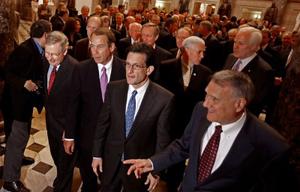Freshman lawmakers receive terrorism briefing
Last week new members of the U.S. House of Representatives were briefed on the current state of terrorism; their briefing warned that while al Qaeda had been disrupted it was still a dangerous organization; al Qaeda is increasingly turning to radicalization of American Muslims to carry out small scale attacks; the briefing also covered the delicate balance between expanded policing powers and civil liberties as Americans want security, yet are highly suspicious of the federal government; in moving forward the briefing urged lawmakers to candidly reassess costly security measures in light of growing fiscal concerns

Congressional freshmen with seniors receive terror briefing // Source: veteranstoday.com
Last week the incoming freshmen class of the 112th U.S. Congress was briefed on the current state of terrorism by Brian Jenkins, the director of the Mineta Transportation Institutes National Transportation Security Center of Excellence, and Juan Zarate, the former deputy security advisor for combating terrorism.
The briefing covered trends in terrorism, government counter-terrorism policies, concerns over civil liberties, and important questions to consider moving forward. Jenkins noted that while the United States has been successful in deterring terrorist attacks since 9/11 and its “unrelenting campaign” against terrorists has undermined their operational ability, extremists are still determined to strike at America.
Rather than focusing on large scale mass casualty attacks, al Qaeda has shifted its attention towards smaller attacks on less secure areas.
Jenkins stated that “al Qaeda has become decentralized, so smaller deadly attacks are seen, such as the killing or wounding of 44 U.S. soldiers by Army Major Nidal Hasan at Fort Hood, Texas.”
Part of al Qaeda’s new strategy is to radicalize American Muslims, emphasizing “do-it-yourself terrorism” where individuals are urged to carry out whatever attack they can wherever they are.
These attacks generally lack the sophistication of centrally planned efforts and are smaller in scale, but they can still be fatal and al Qaeda is likely to continue pursuing this tactic as even unsuccessful attacks, like the failed car bomb in Times Square New York, stir considerable fear.
Adding a bit of good news, Jenkins said that, “Fortunately, the number of homegrown terrorists is small. In more than eight years, 125 have been arrested or indicted — a very small fraction of the estimated three million American Muslims.”
Jenkins warned the new representatives that Americans are suspicious of their government, yet demand absolute protection, which limits approaches that the government can take in addressing terrorism.
“Willing to share remarkable amounts of personal information on vast social networks, they reject government infringements on their privacy. They are angry over irksome security measures. But if we accept that the country is at war with tenacious terrorist foes determined to attack American targets, we cannot feign shock and outrage when those foes carry out an attack.”
Further complicating matters, Americans want improved intelligence gathering capabilities, but are alarmed by the growing domestic spy infrastructure and the expanded capabilities of intelligence agencies. These seemingly opposing views make it difficult for legislators to achieve desired goals without angering voters.
Other democratic countries have responded even more harshly to terrorism by imposing censorship on the news media, suspending other civil liberties, and even altered trial procedures. He argues that the United States has taken a milder approach, expanding policing powers while still striving to maintain civil liberties.
In moving forward Jenkins posed several questions for lawmakers to mull over.
With al Qaeda doing as much as 99 percent of its recruiting online, should the government take more aggressive measures in securing the internet?
He pointedly asked, “Why should government not assert more direct control over the Internet, outlawing incitement to terrorism as it now outlaws child pornography and other forms of online crime?”
On the topic of aviation security, he counseled lawmakers to “fundamentally review how airline security is provided,” suggesting that it was time to rethink current aviation security procedures.
Jenkins also urged lawmakers to consider whether it was necessary to devote more resources to securing other modes of public transportation. Terrorists have already successfully carried out attacks on trains and buses across Europe, making the question all the more urgent.
Finally, in a nod to growing fiscal concerns, Jenkins asked if security expenditures should remain untouched. He advised lawmakers to create a sustainable strategy that balanced both fiscal responsibility and security, because these new safety measures are likely to become a permanent part of our society.
According to Jenkins, economic success is a critical component of the nation’s strength and a key aspect of national security. Therefore conducting candid reviews of security measures and intelligence procedures will be crucial moving forward as Congress cannot be constrained by unrealistic demands and fear.
Jenkins is a former U.S. Green Beret officer and serves as a deputy chairman of Kroll Associates, an international investigative and consulting firm.
